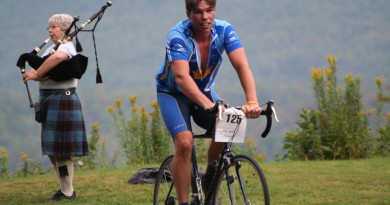Growing Evidence that Lance Doped
By
John Morton
Posted March 6th, 2011
Seven years ago, I wrote a column in Vermont Sports entitled, “I Want to Believe in Lance.” At the time, the U.S. cycling icon was poised to win an unprecedented sixth Tour de France, but the publication of L.A. Confidential by David Walsh and Pierre Ballester, accused Armstrong of using performance enhancing drugs. Lance vehemently denied the accusations stating repeatedly that “neither he, nor any of his U.S. Postal Service teammates had done anything illegal.” Another frequent Armstrong retort to the nearly constant questions from the press about doping was, “I have been tested hundreds of times and I have never failed a drug test.”
I should state here for the record, that I believe in the concept of “innocent until proven guilty.” All of us received a vivid reminder of that concept not long ago when several Duke University lacrosse players were accused of sexually abusing a female entertainer, whom they had hired for a party. Encouraged by a voracious media and an overzealous prosecutor, many of us convicted the athletes in the court of public opinion, only to learn later that the entertainer had fabricated her story and the athletes were innocent.
Having said that, I am tired of athletes who stridently maintain their innocence until faced with overwhelming evidence against them, when they suddenly become repentant and admit to “making bad decisions.” In general, successful athletes are not stupid people, especially where sports performance is concerned. Many are very sophisticated about training regimens, nutritional supplements, equipment refinements, etc. It is difficult for me to believe, with the possible exception of a few teenaged, East German swimmers back in the ‘60s, that top athletes aren’t fully aware that they are doping when they inject themselves with something to improve their performance.
If you want to give Lance Armstrong the benefit of the doubt, what he stated in an interview I saw on television, is probably true. According to a recent expose in Sports Illustrated, Lance may have had access to a new drug called HemAssist, created to treat victims of trauma and severe blood loss. Since the drug was still in trials, and thus not yet on the banned list, Lance could technically state that he and his teammates had done nothing illegal.
It is also reasonable to assume that anyone as dominant as Lance Armstrong was in international cycling, is going to generate some envy and bruised egos. Consider the team dynamics of the Tour de France. A group of the world’s best riders ally themselves behind a “favorite” whom they protect and pace to the victory. Certainly the motivation for most of these journeymen cyclists is to someday earn that coveted distinction of favorite, and win the Tour themselves. According to the Sports Illustrated article, a significant number of Armstrong’s former teammates and support staff are coming forward, relating what they heard or observed. Could this all be a result of envy and jealousy, or is it perhaps an overdue sense of conscience and a desire to assuage their guilt.
Perhaps the most noteworthy recent development is the involvement of Jeff Novitzky, the FDA’s investigator responsible for bringing to justice several participants in the BALCO illegal performance enhancement case. As a result of Novitzky’s work, several people went to jail, including multiple, Olympic medalist, Marion Jones. In addition, a congressional sub-committee was motivated to hold hearings on the use of steroids in Major League Baseball. San Francisco Giants slugger and home run king, Barry Bonds, is still under investigation for perjury. The fact that Novitzky has turned his attention toward Armstrong, suggests that the investigator suspects that the famous cyclist is hiding something.
This entire situation is especially tragic because, since his recovery from cancer, Lance has done so much to raise awareness and funding for cancer treatment. There is no doubt that the millions raised through Armstrong’s Livestrong Foundation have significantly advanced research into the causes and possible cures for cancer. Equally important, as a cancer survivor himself, Lance has inspired people around the world who struggle with the disease.
In conclusion, I suspect Lance did what he thought he had to do to win, and in the long standing culture of the Tour de France, that meant unethical performance enhancement. To his credit, he was careful how he answered the constant accusations, and he probably didn’t actually lie. My guess is, if he admitted his youthful lapse of judgment, in the heat of battle, so to speak, and vowed his continued commitment to fighting cancer, the majority of sports fans would accept his confession and be grateful for his help in the search for a cure.
John Morton is a former Olympic biathlete and Nordic ski coach. He lives in Thetford Center, VT, where he designs Nordic ski trails. You can reach him through his website, www.mortontrails.com.

